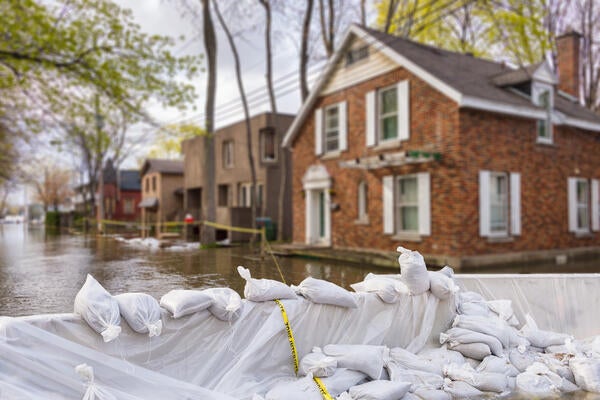
Waterloo research: Lost medieval village holds climate change lessons
Coastal flooding forced medieval villagers to abandon English community 600 years ago

Coastal flooding forced medieval villagers to abandon English community 600 years ago
By Deepa Jolly St. Jerome's UniversityA Waterloo historian is leading a team of researchers to unearth the remains of a lost medieval village in the south of England, hoping to find lessons about climate change.
Villagers who lived near Herstmonceux, East Sussex abandoned their community 600 years ago when coastal floods, increased rainfall, and changing temperatures threatened their livelihood. Now, Steven Bednarski, a professor in the Department of History, is working with a team of historians, archaeologists and paleontologists to unearth the past.

Zack McDonald and Andrew Moore are University of Waterloo students working on the Herstmonceux Project in the south of England.
“Climate change is a pressing global concern. Governments, researchers, and the public benefit from a more sophisticated appreciation of historical climate,” says Bednarski. “By contrasting a modern problem against an historical one, we see more readily how climate affects people.”

Steven Bednarski, professor, Department of History
As a co-lead on the Herstmonceux Project, Bednarski hopes to offer alternative perspectives on our current climate crisis by revealing how people lived and left the pre-modern settlement of 1250-1440. Archaeological artifacts unearthed at Herstmonceaux will seed Canada’s first museum collection on medieval culture and environment, housed at St. Jerome’s.University, which is affiliated with the University of Waterloo.
“History demonstrates how nature plays an often dominant role in shaping everything from culture to politics and technological development,” says Bednarksi.
The project offers a rare humanities-based contribution to the growing discourse on global climate change, he adds. “While scientists can study climate change as an isolated and measurable phenomenon, a humanities approach underscores how nature, people, and culture are inextricably linked. To halt potentially harmful interactions with nature requires deep changes to culture and lifestyle.”
A recent Social Sciences and Humanities Research Council (SSHRC) grant led by Bednarski and his collaborator, Scott McLean, a history professor at the Bader International Study Centre, Herstmonceux, established a formal partnership between the University of Waterloo, St. Jerome’s University, the Bader International Study Centre, and Queen’s University. The partners share expertise, resources, and students. They provide training in archives, archaeology, conservation, and environment through an international setting.
Students who collaborate on the project become adaptive and competitive on the world stage while finding ways to contribute to the discourse of climate. This week is International Education Week at the University of Waterloo. Find out more about events happening on campus and how you can participate.

Read more
Researchers awarded funding to investigate ecology, climate change, repatriation, health and well-being through cultural and historical lens

Read more
Meet five exceptional Waterloo graduate students crossing the convocation stage as Class of 2025 valedictorians

Read more
Waterloo researchers propose solution to help communities escape the costly cycle of flood damage and rebuilding
The University of Waterloo acknowledges that much of our work takes place on the traditional territory of the Neutral, Anishinaabeg, and Haudenosaunee peoples. Our main campus is situated on the Haldimand Tract, the land granted to the Six Nations that includes six miles on each side of the Grand River. Our active work toward reconciliation takes place across our campuses through research, learning, teaching, and community building, and is co-ordinated within the Office of Indigenous Relations.